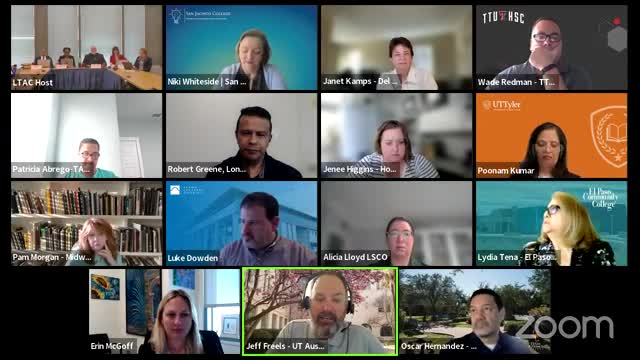AI tools promise revolution in digital accessibility efforts
June 21, 2024 | Higher Education Coordinating Board (THECB), Departments and Agencies, Executive, Texas

This article was created by AI summarizing key points discussed. AI makes mistakes, so for full details and context, please refer to the video of the full meeting. Please report any errors so we can fix them. Report an error »

In a recent government meeting focused on digital accessibility in education, participants discussed the pressing need for effective remediation of learning materials, particularly in light of compliance with accessibility standards. A key highlight was the collaboration with a professor of educational psychology to research the implementation of accessibility measures within educational institutions. The professor emphasized the importance of not only fixing documents but also understanding the organizational challenges involved in making learning materials accessible.
The conversation revealed that a significant portion of educational documents, particularly PDFs, remain inaccessible. At the University of Texas at Austin, estimates suggest that 60 to 80% of over half a million documents uploaded each semester are at least slightly inaccessible. The difficulty in remediating these documents, especially those locked by publishers, was a major concern. Participants acknowledged the potential of artificial intelligence (AI) to streamline the tedious process of accessibility remediation, although effective tools are still lacking.
The discussion also touched on the use of Ally, a tool adopted by the university to assess document accessibility. While Ally provides valuable data and compliance scores, it does not automatically fix accessibility issues, leading to calls for more comprehensive solutions. The cost of such tools was highlighted, particularly for smaller institutions, prompting suggestions for shared services to reduce expenses.
Moreover, the meeting underscored the importance of integrating student voices into discussions about AI in education. Participants noted a disconnect between faculty perceptions of AI, often viewed as a tool for cheating, and students' desire to learn and effectively utilize these technologies. Proposals were made to create platforms for students to share their insights on AI and its role in their education, fostering a more collaborative approach to technology in learning environments.
The meeting concluded with a commitment to prioritize accessibility and the ethical implications of AI in education, recognizing the need for ongoing dialogue among faculty, students, and administrators to ensure that all students benefit from equitable learning opportunities.
The conversation revealed that a significant portion of educational documents, particularly PDFs, remain inaccessible. At the University of Texas at Austin, estimates suggest that 60 to 80% of over half a million documents uploaded each semester are at least slightly inaccessible. The difficulty in remediating these documents, especially those locked by publishers, was a major concern. Participants acknowledged the potential of artificial intelligence (AI) to streamline the tedious process of accessibility remediation, although effective tools are still lacking.
The discussion also touched on the use of Ally, a tool adopted by the university to assess document accessibility. While Ally provides valuable data and compliance scores, it does not automatically fix accessibility issues, leading to calls for more comprehensive solutions. The cost of such tools was highlighted, particularly for smaller institutions, prompting suggestions for shared services to reduce expenses.
Moreover, the meeting underscored the importance of integrating student voices into discussions about AI in education. Participants noted a disconnect between faculty perceptions of AI, often viewed as a tool for cheating, and students' desire to learn and effectively utilize these technologies. Proposals were made to create platforms for students to share their insights on AI and its role in their education, fostering a more collaborative approach to technology in learning environments.
The meeting concluded with a commitment to prioritize accessibility and the ethical implications of AI in education, recognizing the need for ongoing dialogue among faculty, students, and administrators to ensure that all students benefit from equitable learning opportunities.
View full meeting
This article is based on a recent meeting—watch the full video and explore the complete transcript for deeper insights into the discussion.
View full meeting
